We recently sat down (at a distance) for an interview with Paola Stefani, producer of the movie Huicholes: The Last Peyote Guardians. Together with the director of the film, Hernán Vilchez, and with the collaboration of the protagonist, Wixárika Mara’akame or spiritual leader José “Katira” Ramírez, and with the approval of the authorities of two communities, they have launched a campaign to raise funds for those communities in support of their ceremonial work. It is called a “Spiritual Health Shield” against the spread of Covid-19 in the Wixárika communities — and far beyond. We let Paola explain.
Leer el artículo en Español AQUÍ
Tracy: Thank you, Paola, for taking the time to chat with us. First, how should we identify you, other than being the producer of this award-winning film … You’re an anthropologist, right?
Paola: Yes, I am an anthropologist at the National School of Anthropology and History and I am a film producer and promoter. I have been working in the promotion of documentary film for many years, and I have specialized in what is called social impact productions, so that a film reaches a specific audience in order to generate a change, in peoples’ mentalities or through a specific action. And I believe that with Huicholes: The Last Peyote Guardians, what we achieved was to strengthen the message of the Wixárika people for the Defense of Wirikuta, the sacred Birthplace of the Sun according to their cosmology.
When we released the film, there was already the ruling in favor of the Wixárika people for the suspension of mining in Wirikuta. But with the film, what we did was strengthen the message that the Wixárika people had started in 2010.
We’re turning 10 years old, Tracy, speaking of the movement to defend Wirikuta, and you and I are about to complete 10 years working together.
Tracy: Yes, that’s true. Hard to believe, right?
Paola: Yes. Who would have thought that ten years later we would still be working on this? In other words, what is clear is that these struggles are long-term. They are not resolved overnight. I have always believed that the message of the Wixárika people is very powerful and that, in addition, they were the point of the spear for the defense of the territory. And that their fight spread to other peoples in Mexico and in the world, letting people know they have the right to demand that certain projects such as mining not be carried out in their territories. The Wixárika people have a very high degree of responsibility and pride, for having taken this very long path.
And the other day when I was looking at the roundtable discussions that Diana Negrín organized around the ten years of the defense of Wirikuta, I was delighted to see so many young people participating in the work and with other perspectives and another way of seeing a process of which the film finally tells the story of that year and a half, which for me was like five years because of so much intensity and shared passion.
So, when we released the movie in 2014 there in Wirikuta, the mining operations had already been suspended for over a year. But the message had to be sustained. I think the movie has served that purpose.
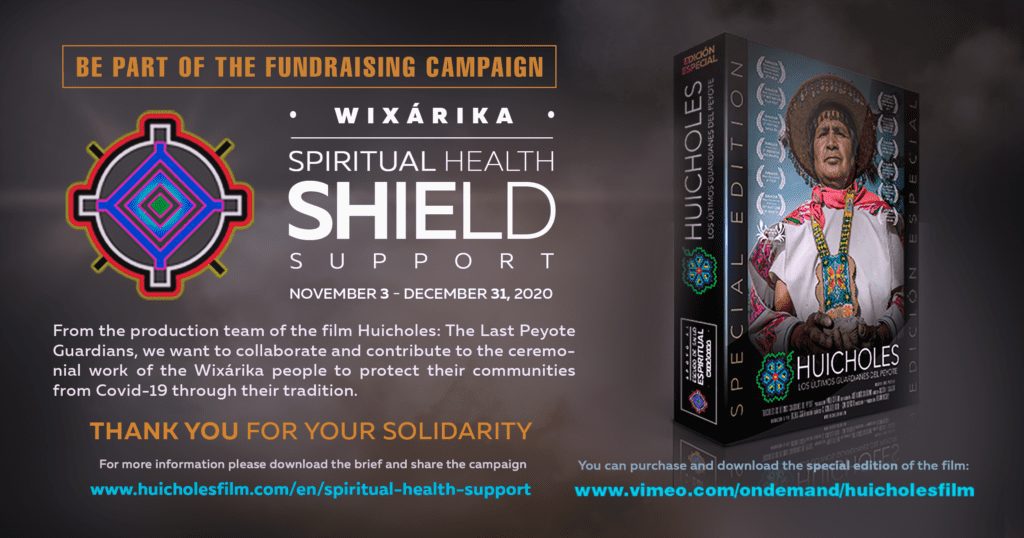
Tracy: And six years later we are still talking about the movie. These problems are still very active and very current. But now we are talking about this campaign for a spiritual health shield. Can you tell me a bit about this campaign and what it consists of?
Paola: When the pandemic started, I was talking with Hernán Vílchez, director of the documentary, and we decided to make the film free for everyone again. It has been free for Latin America on our site for more than 4 years. During the early months of the pandemic, we made it free for a limited time throughout the world.
We realized that the health crisis that we are going through has to do with the asymmetric relationship that human beings have created with nature. And finally the film, beyond dealing with a political issue, also deals with this relationship in the spiritual aspect. It shares the Wixárika people’s prayer for a harmonious vision with the deities and with nature.
So we felt it was important to reintroduce the film with access for all. And there The Esperanza Project and Voices of Amerikua joined us in its promotion. We received a tremendous response — more than 40,000 views in the first weekend.
In our social media networks, I begin to realize that certain citizen initiatives had been activated, and also by the State of Jalisco, to bring materials, mainly health supplies, to the communities of San Andrés, San Sebastián, Santa Catarina and others. I begin to see that there were projects to bring masks, gel, soap, medical supplies, and basic products to help mitigate the pandemic.
One day I asked Gilberto from the Grupo Alianza de Jicareros Teukari: How can we help?
Gilberto was the one who told me that speaking with some ma’arakate (shamans) and some Wixaritari governors, authorities and friends, they expressed that not only are health supplies needed, but that support is required for spiritual work to take care of the health of all, which seemed totally consistent with the worldview of the Huichol people. So in conversations with Katira, we talked about a health shield. And I imagine, and I believe in it, that from prayer and song, protective shields around the communities are generated.
So, Hernán, Katira and I talked and agreed to propose to the Wixárika authorities of four communities to sell the film, and that with the proceeds from the sales they can collaborate with inputs for the ceremonial work.
In six years we have never sold the movie online. It has only been for rent. We did a small DVD production that helped us pay for the tour that took place in 2014 in the United States and Canada, and we have also sold educational licenses to universities in those countries. But we have never sold a download of the movie.
We understood the difficulties that were being experienced in the communities as a result of the confinement, which impaired their ability to generate money through the sale of art and crafts, and diminished the opportunities for work in general, and we agreed with the authorities that support for ceremonial work is a priority.
So Hernán and I organized our ideas, we agreed on the name Spiritual Health Shield, and we made the concrete proposal to the communities. We received responses from San Andrés Cohamiata and San Sebastián, who included in their letters of acceptance that we launch the campaign they make a list of what what they will need for ceremonial work. We had planned to do this campaign from September to November. We fell behind — I mean, in a pandemic everything is late. So finally we decided to launch the campaign on Nov. 3 and it will run until the end of this year, and we set a sales goal of 250 copies.
From the proceeds we are going to deliver the supplies directly with the support of Jalisco organizations.
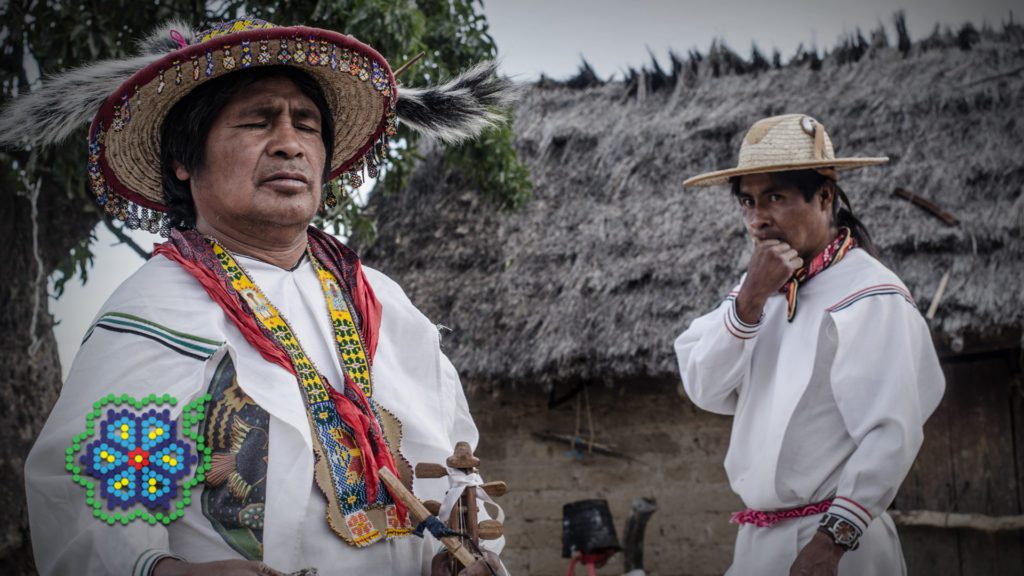
The campaign is very clear: of the net collected, 70% goes to the communities of San Andrés and San Sebastián, and 30% remains for the production team to be able to carry out the campaign.
The movie is finally an independent film. In other words, we have done everything with our own money and with our labor and our love. It is a film that we have shown for six years and for the most part, for free. More than 500,000 people have seen the film in more than 80 countries.
We have a film that we consider to be still current thematically and that has always had a very good response. We hope that many people who have followed the film will have the sensitivity of being able to support us with $15 so that these communities can be supported with ceremonial supplies so that they can continue doing their spiritual work. That’s the idea. And we have an agreement with the authorities. Everything is clear and on track.
Tracy: Ok, I understand and I am imagining that our readers may be curious what this spiritual work consists of. What does this work of building a spiritual health shield against Covid consist of? How does it look? How does it work?
Paola: Well, Tracy, I don’t know how to answer because I am not a Wixárika.
Tracy: No, but you have accompanied the Wixárika people for many years — so, from your anthropological perspective and as a friend of the Wixárika people, how do you see it?
Paola: Well, I believe in the magical spiritual world and I have a belief about the importance of the relationship of people with nature and with the spirit so that our world is more fair and balanced. So I think that spiritual health has to do with this, too, and with being in harmony between your mind, your heart and your body, right? So, when I think of a spiritual shield, I believe that there is a collective prayer that protects us, that is, in community, and that we are all asking for the health of humanity, our loved ones, our family and the world.
And when we began to accompany the Wixárika people in the defense of Wirikuta, they taught me that their prayer was not only for the Wixárika people, but that it was for all of us, for all the beings that inhabit the planet and the universe.
So I cannot conceive of the Wixárika people without their prayer, and in a crisis situation like the one we are in now, prayer becomes more important. The spiritual work of the Wixárika people has to continue; it cannot be suspended due to not having candles, or not for not having chocolate. I think that we also have to continue supporting with basic products such as face masks, gel, etc.
I remember very early in the epidemic supporting a campaign in the Wixárika language to explain what Covid was. So in the same way that you have to support in many aspects of life, I believe that you also have to support that spiritual work. So, to the extent that we are all in an economic crisis — there is a world crisis — from which we are not exempt, right? It is in this sense that we created this spiritual shield campaign, and I trust that the people who read us and have seen the film in past years will support the initiative and the Wixárika tradition, from which we have received a lot.
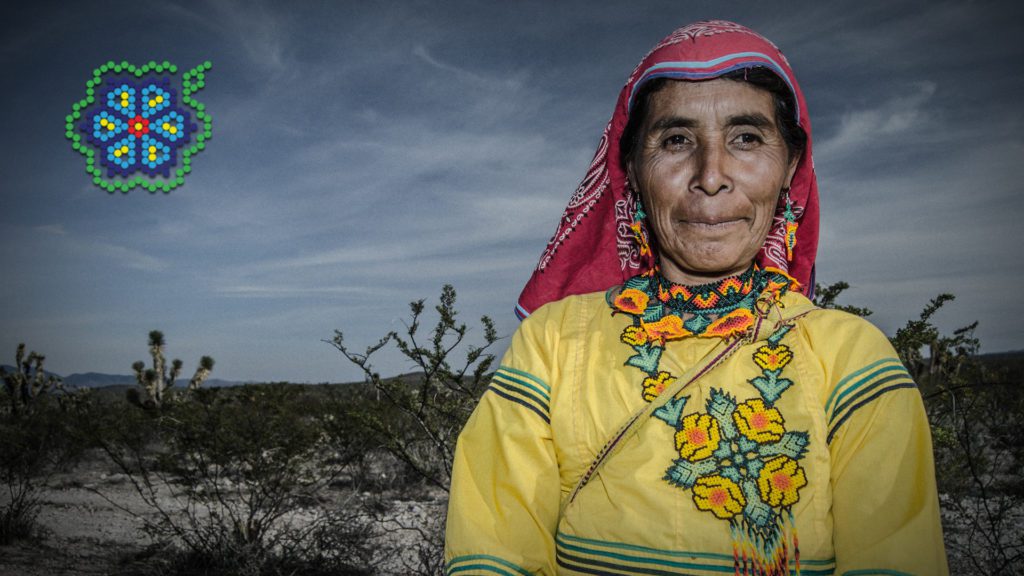
Tracy: It makes sense to me.
Paola: This is how I understand it. And when we brought up the idea with Katira, he liked the idea of the shield. And when Gilberto told me that spiritual work is also important to attend to, I said yes, of course, of course … “How great that you understand,” that is how he responded.
So I think you have to be very respectful of traditions and the way that each person understands how to deal with an exceptional situation like the one we are experiencing.
Each person takes care of their health according to their culture and beliefs, and for the Wixárika people, like many other peoples, the health of the body is not separated from the spirit.
Every year when the Wixárika people go on pilgrimage, many ceremonial centers ask for support. Now we are asking for support for the authorities and the communities in the context of the pandemic. Covid puts us all in a different situation and asks us to accept that we can support each other in these difficult times.
I think this is a good time to do it. So we are making the film available for this purpose.
I mean, ultimately the film was made to help, to support the Wixárika people, and to make known what was happening in Wirikuta. That was always our goal. And I think that the health of the Wixárika people also depends on the health of Wirikuta.
Tracy: Yes, it’s intimately connected.
Paola: If there are people who have not seen the film, there are still possibilities to see it and get closer to knowing the importance of Wirikuta for the Wixarika people, and for the world.
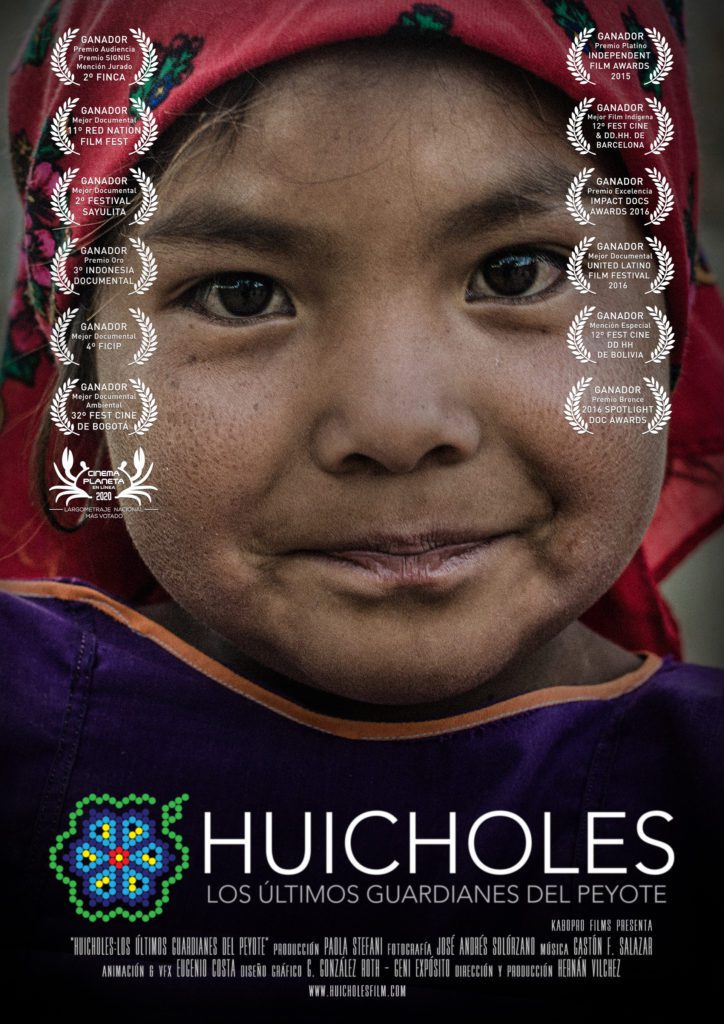
Tracy: And what is the goal, exactly?
Paola: The idea is to sell 250 copies. And I think to contribute 15 dollars, that is not much money, either.
Tracy: Yes, and I imagine that people who have already seen the movie will want to take the opportunity to help by buying and sharing it, right?
Paola: Sure, exactly. Hopefully it will be like that.
So I want to appeal to all the people who have seen the documentary, to those who work with the Wixárika people and who have supported the defense of Wirikuta all these years, that there is an opportunity to contribute.
We believe that the defense of the territory and the right of indigenous peoples to decide on their territories and care for the environment is extremely important and that we must support them, and thus also their spiritual work seems essential, beautiful and very generous with humanity.
To clarify, we are not promoters of the consumption of peyote. We are concerned about the Hikuri (peyote) situation. The reality is that mining is not the only threat in Wirikuta, there are others such as agribusiness, the tomato industry, the massive egg farms … that is, Wirikuta continues to be a very vulnerable place.
I was there about two years ago, and the truth is that it had a great impact on me, as I saw the tomato greenhouses stretching out over miles and miles of the desert. Those companies completely remove all the native flora.
Tracy: Yes, the truth is, and there are thousands and thousands of hectares, where they destroy everything, and they continue to grow throughout the region. And also, the suspension of the mining concessions is not final, right?
Paola: That’s right. it’s a suspension — that is, the cancellation doesn’t exist yet. The Wixárika Regional Council and specifically San Sebastián have remained very firm in upholding its protection. The ejidatarios linked to mining have asked the Wixaritari to remove the protection. The Wixaritari have publicly stated that they are not going to remove it, and it seems to me to be the right thing to do.
This activity continues at the level of the courts, in the legal field. However, it is sad to see other industries such as agribusiness continue to advance throughout the region.
Perhaps in these years we have not known how to communicate the other threats very well, we have not known how to work on these issues. Also in the mountains they have their own problems, and in Haramara, and in the other sacred territories.
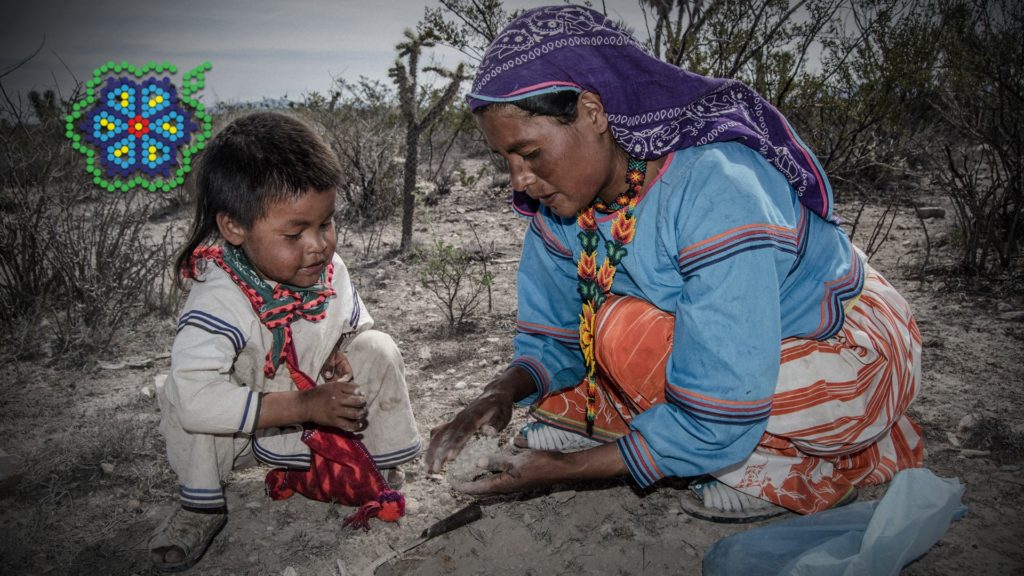
(Courtesy: Huicholes Film)
Tracy: One of the things that I would like to ask you, Paola: What have you learned in this whole process? And it may be that we are talking about the process of putting together this campaign, or the film, or the defense of Wirikuta itself.
Paola: I will always say, Tracy, that those two years in which we worked intensely for the defense of Wirikuta were the happiest years of my life. I keep working, with less intensity. But the truth was that they were very creative years, where I discovered that I could do many things. Also both the film and the defense work itself professionalized me in communications in the social media networks, and the promotion of a very specific documentary film, which has to do with the defense of the territory, the rights of the peoples and socio-environmental justice. I mean, my themes are still the same. Today with other peoples, in other territories.
The Wixárika people touched my heart. They conquered me, they passed along to me their emotions and their magical world.
***
To acquire the documentary visit:
https://vimeo.com/ondemand/huicholesfilm
For more information:
Facebook: @HuicholesTheLastPeyoteGuardians
Twitter: @PeyoteGuardians
Web: www.huicholesfilm.com
Read and share the press release HERE
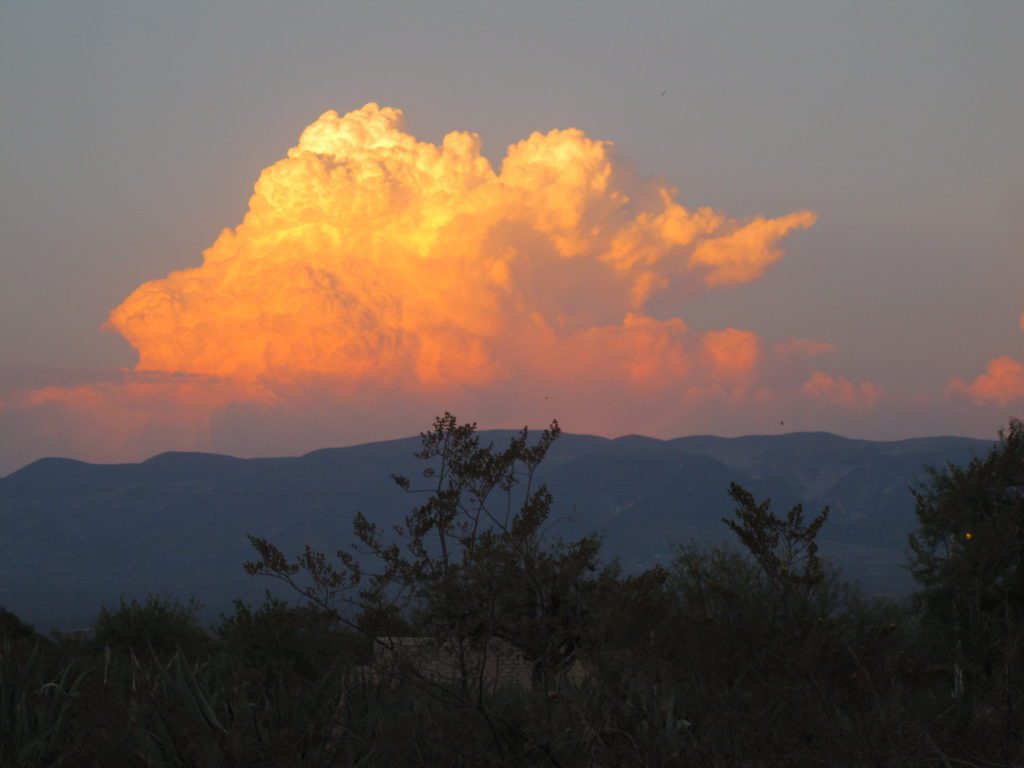
- A Year of Listening, Resistance, and Hope: Reflections from The Esperanza Project - December 30, 2025
- Arts to Breathe: A Continental Act of Dignity - November 28, 2025
- “It’s not grass, it’s a milpa”: Defending Life on Avenida Federalismo - October 8, 2025
Hernan Vilchez Huicholes Juan José Ramírez Katira Last Peyote Guardians Paola Stefani Peyote Spiritual Health Shield Wirikuta Wixarika
I hope everybody who reads this buys a copy to give as a present to a loved one, as I will. It is way to accompany the Wixarica in the stand for what is sacred to all.